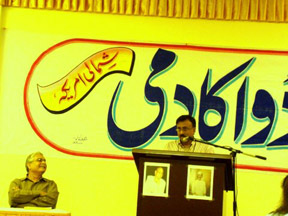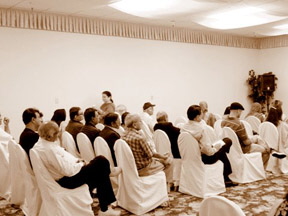|
September 27, 2009
Urdu Academy pays tribute to Mir Anees
Urdu Academy North America’s September 27, 2009 literary evening was dedicated to the life and work of Mir Babar Ali Anees.
Among those who presented Anis’s poetry and marasi include: Ahmar Shehwaar, Asim Bajwa, Essan Hamdani,Dr. Tahir Mahmood and Tashie Zaheer’.
Hameeda Banu Chopra and Sohab Hamdani presented special maqalas on the life and work of the great poet.
Mir Babbar Ali Anis was born in Faizabad in the northern Indian state of Uttar Pradesh in 1803 and died in 1874. Poetry came to him as ancestral heritage, for his forbears, going back to his great grandfather, were eminent poets and men of letters. His father, Mir Khaliq, was a famous poet. Anis was the grandson of Mir Hasan who is remembered for his immortal Masnavi, Sehir-ul-Bayaan.
In keeping with the popular trend, he first tried his hand at the ghazal, but failing to make much headway in this sphere, he changed over, under the advice of his father, to the writing of marsias, in which domain he soon established a high reputation, equaled by his poetic compare, Salamat Ali Dabir. Besides being a master of the marsia, Anis was also a specialist of the rubai, the shortest complete poem in Urdu, containing only four lines. 
According to Muhammad Hussain Azad, "The late Mīr Sahib must certainly have composed at least ten thousand elegies, and salāms beyond count. He composed as easily and casually as he spoke." Mir Anis has drawn upon the vocabulary of Arabic, Persian, Urdu/Hindi/Awadhi in such a good measure that he symbolizes the full spectrum of the cultural mosaic that Urdu has come to be.
The marsia, strictly speaking, is an elegiac poem which is synonym in Urdu literature with the poems written to commemorate the martyrdom and valour of Hazrat Imam Hussain and his comrades of the Battle of Karbala. Although many elegy poems or marsias are written by poets to pay tribute to many political leaders, great poets or sometimes to their beloved relatives but poets have virtually left the field of traditional marsia nigari after Anees and Dabeer.
Dabeer, along with Anis, left an everlasting influence on Urdu literature and marsiya in particular. Marsiya, in its content and matter, allowed the two masters to demonstrate their artistry and command of Urdu language and idiom. The first major and still current critical articulation about Mir Anis was Muazna-e-Anis-o-Dabir (1907) written by Shibli Nomani in which he said "the poetic qualities and merits of Anis are not matched by any other poet."
See video on Motionbox
Continued on page II
|